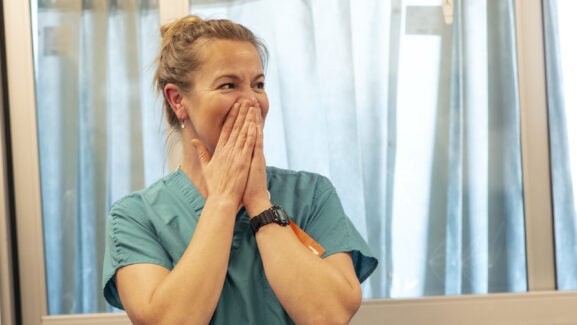
Veterans Day | 20 Submitted Team Member Stories and Photos
Veterans Day, observed annually on Nov. 11, is a federal holiday for honoring military veterans who served in the United States Armed Forces. There are many veterans who work here at UVA Health and, in honor of the holiday, we wanted asked team members to send in their photos. Here's what we received so far.
Thank you to all veterans, here at UVA Health and across the Commonwealth, country, and world, for your service.
We'll be updating this page as more photos come in. If you'd like to be included, please email a uniformed photo to uvaconnect@virginia.edu along with the following:
- Name, title, job at UVA Health?
- In which branch did you serve? What was your rank? When did you serve? What was your job in the military?
- What does Veterans Day mean to you?
- How did your military experience impact your role in healthcare? Does it affect how you care for patients, conduct research, or train students?
Short on time? Just send a photo and your name, branch of service (and dates served), and rank.
Jennifer Rademacher, U.S. Army
At UVA Health Jennifer Rademacher is an RN on 5 South.
"Service from May 2000 to May 2005 in the Ordnance Branch of the United States Army, with an honorable discharge as a Captain. I provided logistics services in the form of maintenance for the 82nd Airborne Division.
"Veterans Day gives me a moment to reflect on the time I spent in uniform and the soldiers I served with as well as those that came before me and paved the way for females in the military.
I know that my military experience provided a lot of the resiliency required for my role in healthcare."
Darren Montieth, U.S. Army
Private First Class, Military Police (on right)
David Callender, U.S. Army
At UVA Health David Callender, MD, MPH, is the Medical Director, University Medical Associates.
Served in the U.S. Army, Major, 2004-2015, Army Physician
What does Veterans Day mean to you? "A time to reflect on the service and sacrifices of all military members. Specifically my family members who have served during the American Revolutionary War, Civil War, World War II, Cold War, and beyond."
How did your military experience impact your role in healthcare? Does it affect how you care for patients, conduct research, or train students? "My military experience was instrumental in my development as a clinician, leader, and educator. I grew up in a military family and was drawn to serve after 9/11. I found myself serving alongside fellow soldiers with richly diverse experiences in life. I would not have encountered these individuals in college, medical school, or my job otherwise. I learned from other’s experiences and their sacrifices. I took away from my experience that service to others, our country, and a bigger picture is essential as we provide care to the public and educate our future physicians.
"Attached is a picture when I returned from a stressful year of deployment to see my 3-year-old daughter and meet my son for the first time. The joy on Anna’s face brought me to tears as she said 'Daddy, I cannot believe it is you.' I will always be proud of my time in the military."
J. Lee White, U.S. Navy
At UVA Health J. Lee White, MD, is an anesthesiologist.
Service: United States Navy
Rank: Captain
Photo: "Taken in Fallujah, Iraq, 2006. I am on the right, sans helmet."
Jeremy Sibiski, U.S. Navy
At UVA Health Jeremy Sibiski, MBA, MHA, FACHE, is Chief Operating Officer, UVA School of Medicine
Service: U.S. Navy, 3 years active duty, 8 total reserves
Medical Service Corps (hospital/clinical administrator)
"I gained an appreciation for being part of a great family and team, where being at work is fun. I am thankful to be part of a similar team here at UVA Health, where everyone here is trying to do what is best for the organization. We are growing research to try and cure diseases, teaching the next generation of medical leaders. We also have nurses going the extra mile to make a patient comfortable, supply chain staff working hard to reduce costs, and great physicians who are trying to improve the health of our patients and community."
Christopher Joseph, U.S. Marine Corps
At UVA Health Christopher Joseph works as a Supply Chain Specialist for UVA Prosthetics and Orthotics.
Service: United States Marine Corps. Staff Sergeant. July 2013-Dec. 2020. Logistics Specialist.
What does Veterans Day mean to you? "Veterans Day is a day to honor those who have served in the United States Armed Forces. I love to celebrate and thank others who have served because there’s a particular bond among veterans through shared experiences and hardships."
How did your military experience impact your role in healthcare? Does it affect how you care for patients, conduct research, or train students? "After spending nine months in Iraq, I was presented with the honor of being a Marine Corps Liaison for the Wounded Warrior Battalion East Walter Reed Detachment. During this time, I was responsible for a section of active-duty Marines who were wounded, ill, or injured. I was also responsible for active duty, reservists, MEDEVACs, or veteran Marines who came to our hospital, Walter Reed National Military Medical Center, as inpatients. This humbling and honorable experience inspired me to want to continue to lend a helping hand within healthcare! My time in the Marine Corps has given me a sense of pride, knowledge, experience, and commitment to everything that crosses my path, and a patient’s care is treated no differently. We give it our all to try and make a difference!"
John Cramer, U.S. Marine Corps & U.S. Army
At UVA Health, John Cramer, MD, is a Hospitalist in the Department of Medicine.
"I was in the Marine Corps from 1985 to 1991 and the U.S. Army from 1998 to 2004.
"I went to Marine Corps Recruit Training Depot Parris Island, SC, for boot camp in August of 1985 at the ripe age of 18. I then went to Naval Air Station Millington, TN, where I became an Airfield Firefighting and Rescue Specialist (aka, a “crispy critter”). The Marine Corps thought that I should attend EMT training and Structural Firefighter Training, and so I did. I served with Marine Air Base Squadron-14 (aka, the Bogue Rats) which later became Marine Wing Support Squadron 271. We were located at an isolated expeditionary airfield on Bogue Sound, NC. I volunteered my skills with the Swansboro, NC, volunteer rescue squad and fire department. My barracks at Cherry Point, NC, was built in 1942 and had five Marines per room and a communal bathroom. My immediate friends were from urban areas of New York and New Jersey. They talked 'funny' and I liked to imitate their accent and they in turn would imitate my eastern Kentucky accent. We were not allowed to describe each other by our race. We were Marines first. If you had to describe another individual they were either “dark green” or “light green”. When my superiors found that I could type 60 words per minute and could actually spell I was quickly yanked off of the airfield firefighting crew and became an administrative clerk and 'truck master.' My time was spent typing letters, inspecting fire trucks, ordering parts, and managing fire truck and equipment maintenance. I remember learning MS-DOS using floppy disks on a computer with a black screen and bright green letters that operated as fast as pond water moved.
"In 1986, I deployed to Turkey as part of a NATO operation called Display Determination to an airfield just above the Iran-Iraq border back. That was back when the U.S. supported the regime of Saddam Hussein when they were at war with Iran. I served beside Turkish soldiers whose discipline amazed me, whose unfiltered cigarettes burned my throat, and whose tea (aka, chai) was very tasty. The only Turkish word I now remember is 'su,' the word for water. I remember seeing plants with white puffs on it and not knowing what it was. It was the first time I had seen cotton growing, ha ha! The only thing the Turkish soldiers knew about the United States was the Dukes of Hazard and, of course, Daisy Duke. 'No sir, I had never met her and, no, women really didn’t dress like that.' Thanks for making the world a better place, Hollywood.
"I also spent a year in Okinawa, Japan. I was assigned to Marine Corps Air Station Futenma with Marine Wing Support Squadron 171 from the summer of 1989 to the summer of 1990. I worked in the same building as native Okinawan firefighters, many of whom had family members die during WWII. Memorial Peace Park, the main memorial for the Battle of Okinawa, had a profound impact on me. About 25% of the civilian populace of Okinawa perished during the battle. Many had committed suicide because of the propaganda they had heard that they would be treated poorly by the Americans. There was one English-speaking TV station available. I still know how to ask where is the bathroom in Japanese — 'toyde wa doko deska?' and a few other greetings and phrases. The Berlin Wall fell that year, I saw it happen on CNN. Celebrated New Years by eating salted and smoked snails, and drinking sake. We would drink our cup dry with a triumphant 'kampai!' I learned how to drive on the wrong side of the road and usually was successful in doing that. In addition, I had the wonderful opportunity to spend some time in Korea as well. I enjoyed a wonderful meal of bulgogi with a Korean family I had met while seated on their heated floor. Was introduced to kimchi as well, but I wasn’t too impressed.
"I left the Marine Corps to enter college in June of 1990. I already had over two years of college from taking night classes with East Carolina University and the University of Maryland Asian Division. I was recalled December of 1990, a few days after Christmas, for 'Desert Storm,' aka The First Gulf War. I was to be a combat replacement, an M-60 machine gunner to be exact. Thankfully, I wasn’t needed and had the opportunity to enjoy Southern California when I wasn’t working. I was discharged again in June of 1991. My final rank in the Marine Corps was Sergeant.
"When I was in the Army I completed my Internal Medicine Residency from 1998-2001 and then served as Chief Resident from 2001 to 2002. From 2002 to 2004, I spent several years teaching medical students from the Medical College of Georgia, as well as Army interns and residents. This all took place at Eisenhower Army Medical Center in Fort Gordon, GA. I served briefly in Kuwait in 2001 in the weeks leading up to combat operations of the Second Gulf War. I was a member of a team of five physicians who taught a Fundamentals of Critical Care Support class to a new group of Battalion Surgeons each week. Importantly, I was able to get a great deal on a beautiful Persian rug which was handmade in Isfahan, Iran. The Surgeon General of Kuwait gave us each a commander’s coin, which was about the size of a coffee saucer. I completed my service to the Army as a Major."
"The military exposed me to a wide variety of humans of different cultures and ethnicity. I learned that we all have common fears, needs, and basic desires. My military background has helped me to connect with others from diverse backgrounds easily and without trepidation. It broadened my horizons and gave a kid from Eastern Kentucky an opportunity to leave my old life behind and start a new one. I was exposed to the best and the worst of this world. This in turn, has made me immensely appreciative of America’s freedom and success. I was taught to modify, adapt, and overcome when I met obstacles and regroup if necessary. Thanks for letting me share."
Wesley Gass, U.S. Army
At UVA Health, Wesley Gass is an RN in the Electrophysiology Lab.
Service: U.S. Army, achieving the rank of Specialist, served from 2000-2004 as an M1A1 Armor Crewman (tanker)
"To me, Veterans Day is about acknowledging all that have chosen to put the safety of the nation ahead of their own personal safety. It is a day about those that have served and are still with us.
"My military experience has impacted my role in healthcare by carrying over the foundations of organization and preparing for the possibility of anything. As I talk to my teams about the day's schedule and assignments, I often drop in 'no plan survives enemy contact,' or as I rush to be 15 minutes early to a meeting, in my head is the mantra “early is on time, on time is late.” My military experience offers me another route to establish a deeper connection with my patients. When I find out my patient was deployed to the same area I was in, or served in the same unit I did, the bond formed can be deeper than expected. As I train students, the organizational aspect of having served in the military becomes evident again. Organizational readiness allows for more fulfilling clinical experiences."
Samantha Hobbs, U.S. Air Force
At UVA Health Samantha Hobbs, MSN, RN, works as an Aortic Center Program Coordinator.
Service: Captain, United States Air Force; as an emergency nurse and coordinated medivac operations in Afghanistan
"Veterans day allows me an extra opportunity to remember (with immense gratitude) the veterans I served alongside and the wounded military members we cared for. I will always be proud of what we accomplished and the hard work put forth by our team every single day."
Bea Clifford, U.S. Army
At UVA Health, Bea Clifford works in the outpatient surgery.
"I served in the U.S. Army from 1986 to 1994 as a surgical technologist. I was stationed in Fort Sam Houston and Fort Campbell, KY."
Mark Weathers, U.S. Army
At UVA Health, Mark Weathers is the Chief of Staff in the School of Medicine.
Service: U.S. Army for 31 years. Nov. 1990-July 2022. Retired as a Colonel.
"I served as a commissioned officer. Branched in Army Aviation. I flew Apache helicopters and served in many other roles throughout my career.
"To me, Veterans Day is a day to remember and honor those men and women that selflessly served in the defense of our great nation."
Keegan McCauley, U.S. Navy
At UVA Health Keegan McCauley is a Pharmacy intern.
Service: Lieutenant, U.S. Navy, 2012-2020
"As a Surface Warfare Officer, I served as the Communication Officer onboard USS Philippine Sea (CG-58), Training Officer onboard USS The Sullivans (DDG-68), and Staff Anti-Terrorism/Force Protection Officer at Naval Surface Squadron 14.
"Veterans Day is a great time for me to reflect. Think about the people I served with, revisit the places I’ve gone, and reconnect with those I’ve lost touch with.
"In the Navy I learned the importance of a strong work ethic, sacrifice, and serving those I worked alongside. I try to bring that mindset with me to work every day."
Lee Morris, U.S. Air Force
At UVA Health, Lee Morris is a Senior Software Systems Engineer working as an Epic Cache Database Administrator. He contributes to one of the Health Information and Technology team goals of maintaining maximum uptime and availability for UVA’s Epic electronic medical record system and server; installing, maintaining, and updating the Epic database engine and applications; and keeping the Epic applications software current. Additionally, he is the primary Technical Lead for the Health System Smartweb systems, which are used for in-house paging and emergency-transport trauma alerts and notifications.
Service: United States Air Force, 1973-77, attaining a rank of E3. Worked as an Integrated Avionics Systems Specialist, which involved troubleshooting and repairing communicational (radios, antennas, etc.), navigational (radar, landing control, etc.), and electronic countermeasures (IFF - identification friend or foe transmitters/receivers) equipment on F-111 fighter jets.
"Veterans Day to me is a day of reflection, remembrance, and thankfulness for all the women and men who are, or have proudly served and sacrificed for our nation’s freedom.
"My military training reinforced a valuable concept that my parents instilled in me and our family while growing up of being a team-player; and working together to accomplish common shared goals. I’ve easily applied the team-player attribute to the different job functions that I’ve had at HSF, UPG, and the UVA Medical Center that I have been tasked with."
Richard Ridge, U.S. Navy
At UVA Health Richard Ridge, PhD, MBA, RN, NEA-BC, CNL, is Assistant Professor in the School of Nursing.
Service: "I served in the U.S. Navy on board the USS Tecumseh, SSBN 628, a ballistic missile nuclear submarine in the early 1970s. I then completed Hospital Corpsman School and was discharged as a Hospital Corpsman, 2nd Class."
What does Veterans Day mean to you? "My mother and father both served in the U.S. Army in World War II. My father survived the December 7th Pearl Harbor attack, which became a very significant day each year in his life. From a very early age, I learned that veterans represented sacrifice and mourning, as well as appreciation and hope. I have deep appreciation for those who currently serve our country in uniform, independent of political beliefs, and a profound indebtedness to those who gave their lives and health in service to our country. I feel an obligation to honor their memories and to express gratefulness to their families every day, but on Veterans Day, I try to remember them all.
How did your military experience impact your role in healthcare? "As a young Corpsman I was given great responsibility by the physicians and nurses I worked with. Many years before the 'To Err is Human' report and the Joint Commission requirement to repeat back verbal orders, I learned through Navy tradition, the value and importance of repeating back and waiting for an acknowledgement, whether it was orders for a heading on a submarine, or for subQ epinephrine for asthma. On a deeper level, I’ve learned how difficult it is to change and improve clinician behaviors and that to bring new ideas to practice and to sustain them is a constant challenge. I’ve learned the value of personal discipline, and from my submarine days especially, that a team is only as strong as the weakest member, and the corollary that each member, including the leader, serves the team."
Richard Westphal, U.S. Navy
At UVA Health Richard Westphal PhD, RN, is the Woodard Clinical Scholar, Professor in the School of Nursing, and Co-Director of the Wisdom and Well-Being program.
Service: "I served in the U.S. Navy for 33 years of active duty. I first enlisted in 1974 before the end of the Vietnam War as a Hospital Corpsmen. In my first enlistment, I had four different duty stations with my longest as a shipboard operating room technician running a primary care clinic for over 650 Sailors. In 1979, I left the Navy to complete my bachelor's nursing degree with support of the GI Bill. I had no intention of returning to active duty. Upon graduation in 1983, I had several nursing job options and I added the Navy to the list as a point of comparison; it was the best offer. I re-entered the Navy with a commission as an Ensign and moved with my family to Oakland, California. My clinical focus of mental health and psychiatric nursing began shortly after reporting to Oakland Naval Hospital. While in my PhD program here at the UVA School of Nursing I was promoted to Captain. My dissertation work on mental illness stigma within large organizations led to my last assignment in Washington, DC, as a program manager for the psychological health and traumatic brain injury programs for Navy Medicine."
What does Veterans Day mean to you? "Every day is Veterans Day for me. The thoughts and memories of my experience, shipmates, colleagues from other services, and things that most people would never believe is a part of who I am. Veterans Day has lots of cues to bring those experiences front and center. I would not say that I celebrate Veterans Day in the way that most people think of celebrating a day. I use Veterans Day to reflect on my military oath to support and defend the Constitution of the United States as embodied by all the people who live here; not just the ones I agree with. I reflect on the lives of colleagues, past and present, who answered the call to serve. My family will reminisce about people, places, and times that were a part of our journey. And, I do wear something that connects me to my core values."
How did your military experience impact your role in healthcare? "The military experience defined my role in healthcare. My training and oath as a Navy Hospital Corpsmen shaped my entire healthcare journey. From the role as a medic, to a nurse, an advance practice provider, and clinical researcher were all informed and or supported by my naval service. Navy Medicine provided opportunities and training that cannot be found in any university or other health system."
George Stetkevych, U.S. Army
At UVA Health , George Stetkevych is a health unit coordinator.
Service: Army, Sergeant First Class, 1985-2006, Military Intelligence
"Veterans Day is the day that we (politely) inform people that service to the nation has a personal face.
"My military experience guides me from the time I clock in to when I leave for home. Courtesy, respect for others, respect for the work of others, and the cutting of Gordian knots in the service of helping my RNs and CNAs do their jobs of patient care better. That's how I contribute."
Gretchen Wiersma, U.S. Army
At UVA Health Dr. Gretchen Wiersma is an Assistant Professor in the School of Nursing.
Service: U.S. Army, Captain, 1987-1997, Army Nurse Corps Officer, working in various roles as a professional RN and Army officer.
What does Veterans Day mean to you? "It is a day of reflection and gratitude."
How did your military experience impact your role in healthcare? "Beginning my nursing career as an Army Nurse Corps officer providing me with a strong foundation as to the role of the professional nurse and set me up to have a very successful career."
Does it affect how you care for patients, conduct research, or train students? "Absolutely it has affected me in all areas, especially research and students, as I have several articles on supporting student veterans in nursing school and it is one of my research areas."
Daniel Griffith, U.S. Army
At UVA Health Daniel Griffith, DHA, MBA, is an Assistant Administrator for Operations, Department of Emergency Medicine.
Service: U.S. Army, Sergeant First Class (SFC, E7); 1994-2014; Command Paralegal
What does Veterans Day mean to you? "Recognizing freedom is not free, it is paid for by the blood, tears, and sacrifice of our nation’s most precious resource, our sons and daughters, mothers and fathers, brothers and sisters — our military service members and their families. The path to our freedom, our democracy, and our future is paved with the names of service members past, present, and ideally the future. Veterans Day is a day to recognize that service is a volunteer process in the United States, not a mandate, and that the commitment is great, the sacrifice is heavy, but as a veteran, it was my privilege to serve, to commit to defend our nation against all enemies, foreign and domestic, and to be recognized on this day is icing on top of a precious gift of service. As we just went through and election time and preparing for another in two years for more national-level offices, Veterans Day is special that we come together to recognize that we are a nation, not parties, and we need to appreciate one another and appreciate our freedoms within the United States and discussions, debates, and elections are a freedom that we should not be battling and abusing one another over. Thank you for recognizing all veterans and their families for the service and sacrifice."
How did your military experience impact your role in healthcare? "The military trained and provided me experiences to lead others, to look at the big picture, and to value the teamwork and team dynamics that makes success a standard. I have been with the Department of Emergency Medicine for nine years; through the events of August 2017 and through the pandemic preparation, response, and vision of success. My time in the Army made me appreciate grace and mercy that allowed me to engage in the work that required dedication and team-focused drive required to make it through difficult and bleak times during duty; service pre-9/11 through service in many overseas locations. With that being said, I will say that without a doubt, the staff and physicians in the Emergency Department are some of the finest people I have had the privilege to work with, and for, in my time here and in the 20 years on active duty. My military service allows me to accept individuals as individuals and appreciate service, commitment, and dedication at levels greater than oneself. Thank you to the Army for allowing me to serve and thank you to UVA and the Department of Emergency Medicine for allowing me to continue to serve."
Greg Farish, U.S. Army
At UVA Health Greg Farish is a VOIP engineer.
Service: U.S. Army, Specialist, 1987-92
Bradley Minter, U.S. Navy
At UVA Health Bradley Minter is a supply supervisor, Supply Chain Management, for the main hospital.
Service: U.S. Navy. Petty Officer Second Class (Surface Warfare). 07-13. (Plankowner) Logistics Specialist onboard USS Sterett (DDG-104).
"Just a time to miss and reflect on the brothers and sisters I gained during my years serving, remembering the ones that are no longer here with us, and trying to maintain relationships with those that are.
"Military experience made me very good at knowing when to speak up and when to keep things to myself. Though many things are, not everything is worth a battle/war."
Latest News


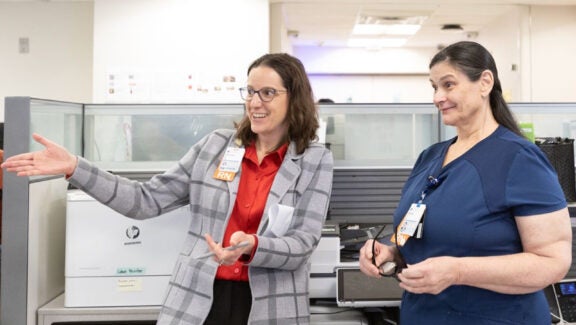
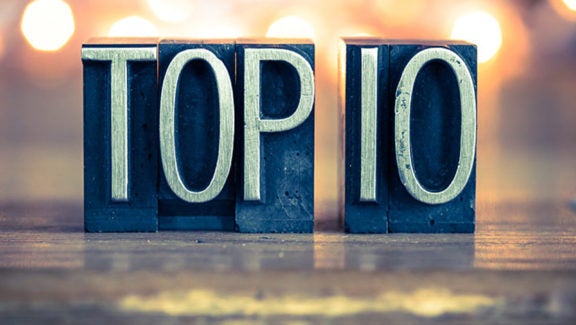
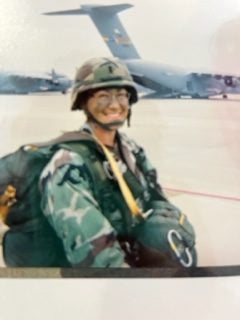
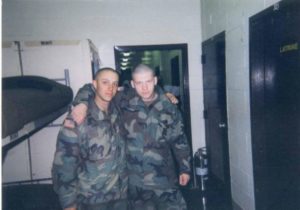
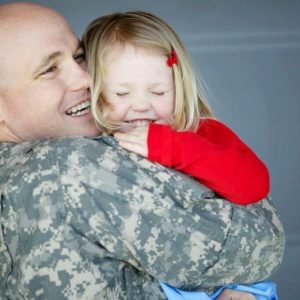
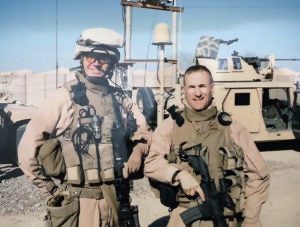
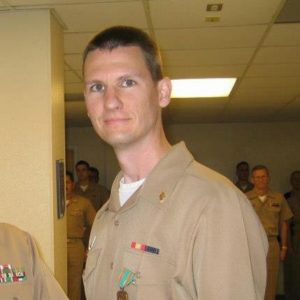
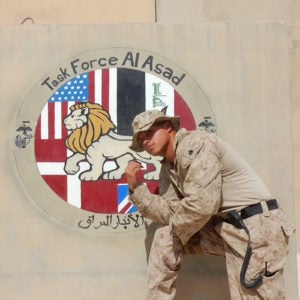
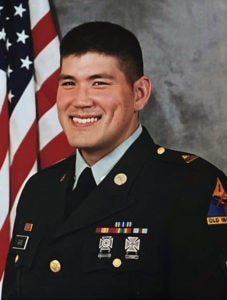
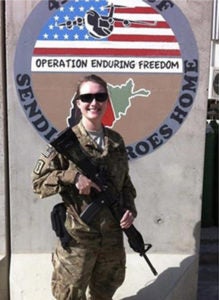
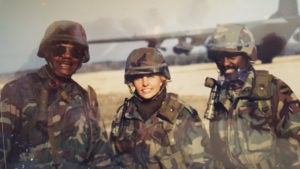
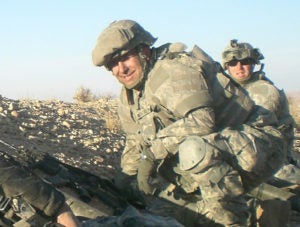
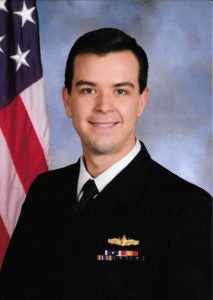
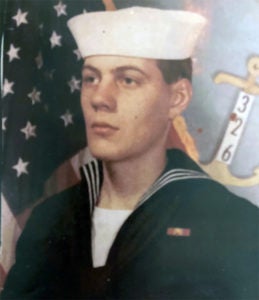
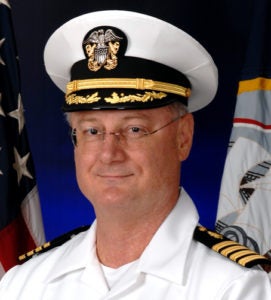
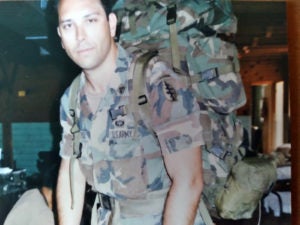
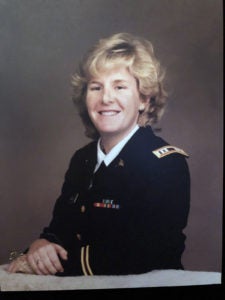
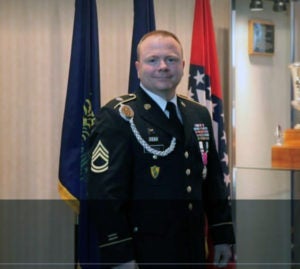
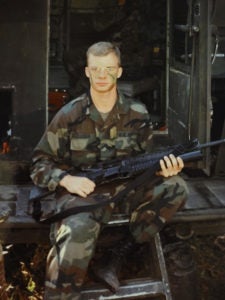
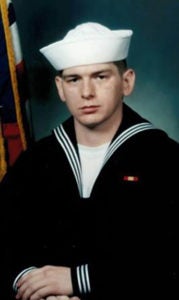
Thank you all so much for your service!
Thank you all. All of you are inspiring!
Thank you for your service. True heroes!!!!
Thank you so much for your service!
Thank you all for your service and sharing. Wonderful to have such experienced, talented folks at UVA. Happy Veterans Day (11/11/2022)
So proud of our veterans! Thank you for sharing your stories.
Thank you all for your service!
Thank you all for your service then and now! We are truly honored to work beside you.